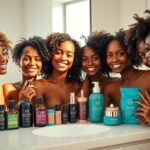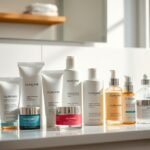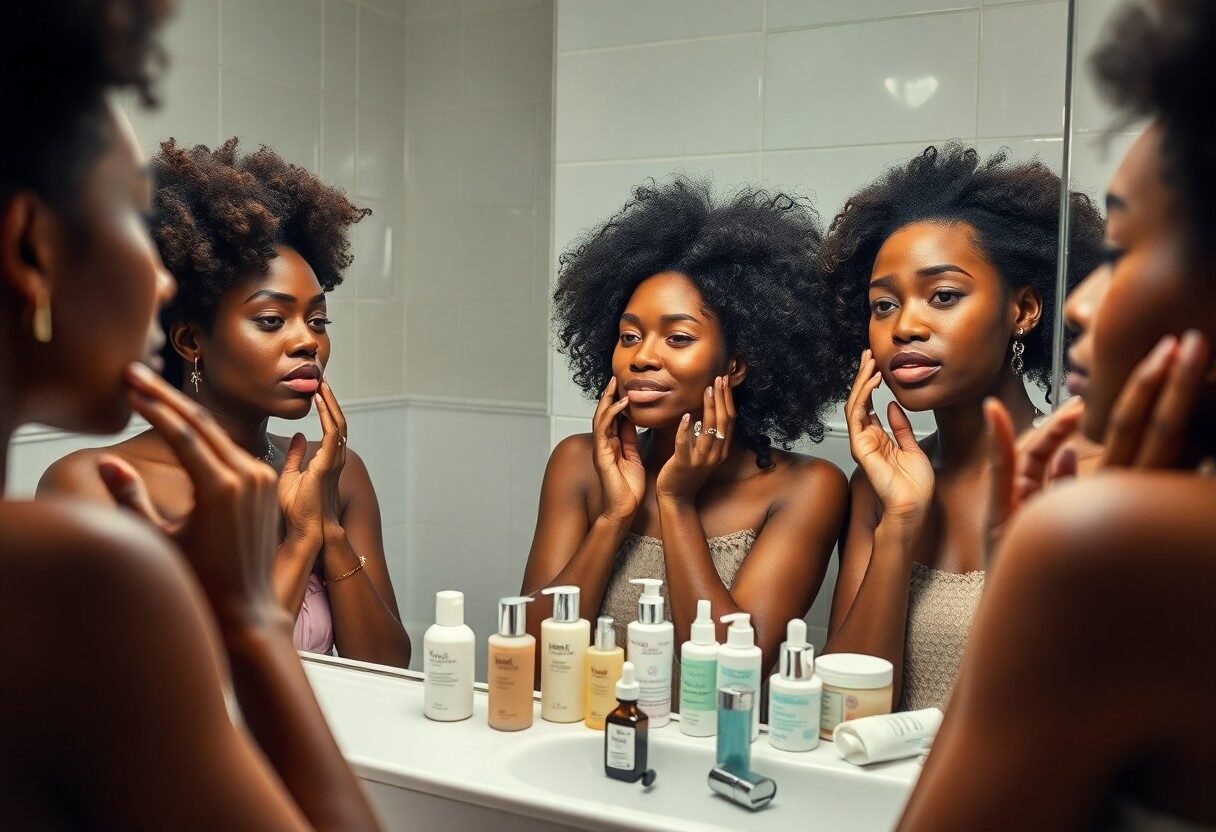
There’s a fascinating diversity in skin types among Black women that deserves tailored skincare routines. I believe understanding your individual skin type—whether it’s oily, dry, or combination—is necessary for achieving a radiant complexion. You might be surprised at how specific products and methods can either enhance or damage your skin. In this guide, I will share effective skincare routines specifically designed to meet the unique needs of each skin type, helping you to not only elevate your skincare game but also celebrate your beautiful skin.
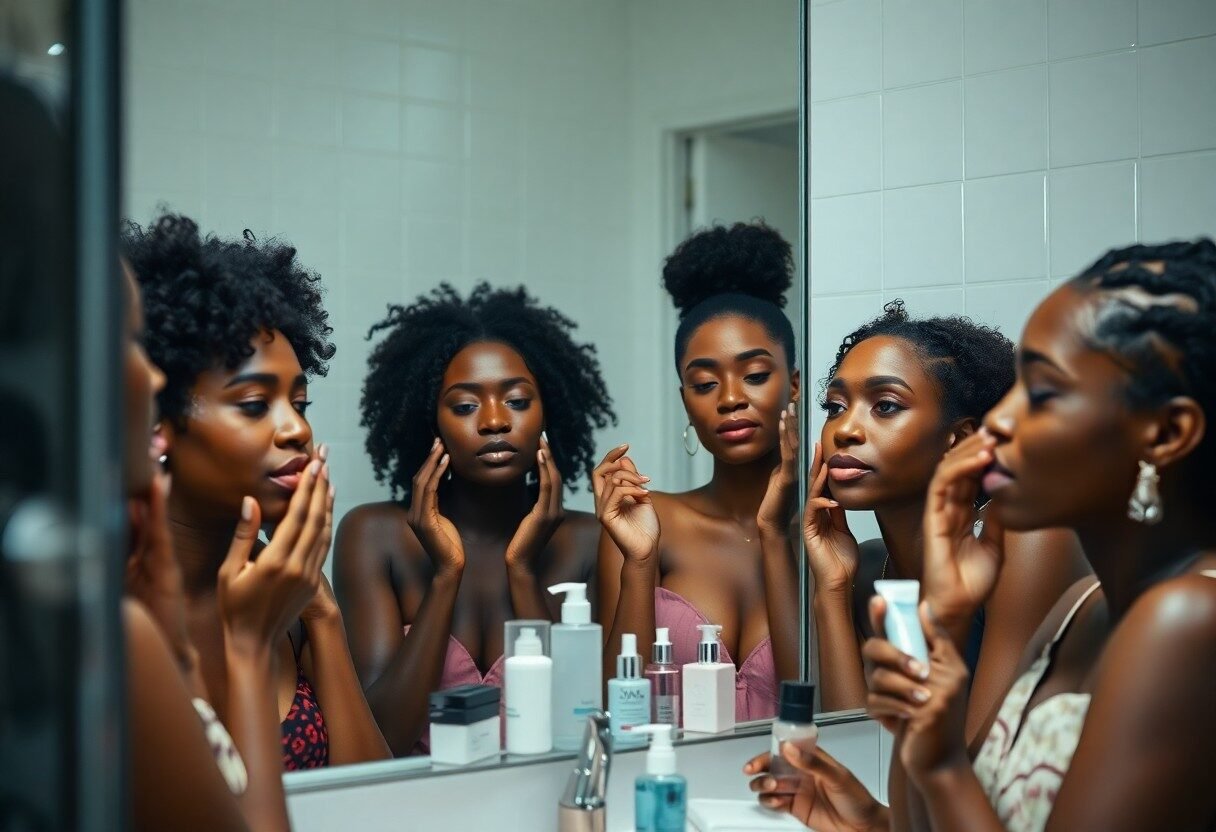
Key Takeaways:
- Understanding your skin type—oily, dry, combination, or sensitive—is fundamental for an effective skincare routine.
- Hydration is imperative; even oily skin needs lightweight moisturizers to maintain balance.
- Incorporate antioxidants, such as Vitamin C, to combat hyperpigmentation commonly experienced by Black women.
- Utilize products with sun protection, especially broad-spectrum SPF, to prevent skin damage and dark spots.
- Exfoliation should be tailored to skin type; consider chemical exfoliants for sensitive or dry skin and physical for oily skin.
- Look for supportive ingredients like hyaluronic acid for hydration, niacinamide for oil control, and shea butter for nourishment.
- Consult with skincare professionals for personalized recommendations and to address specific concerns like melasma or scarring.
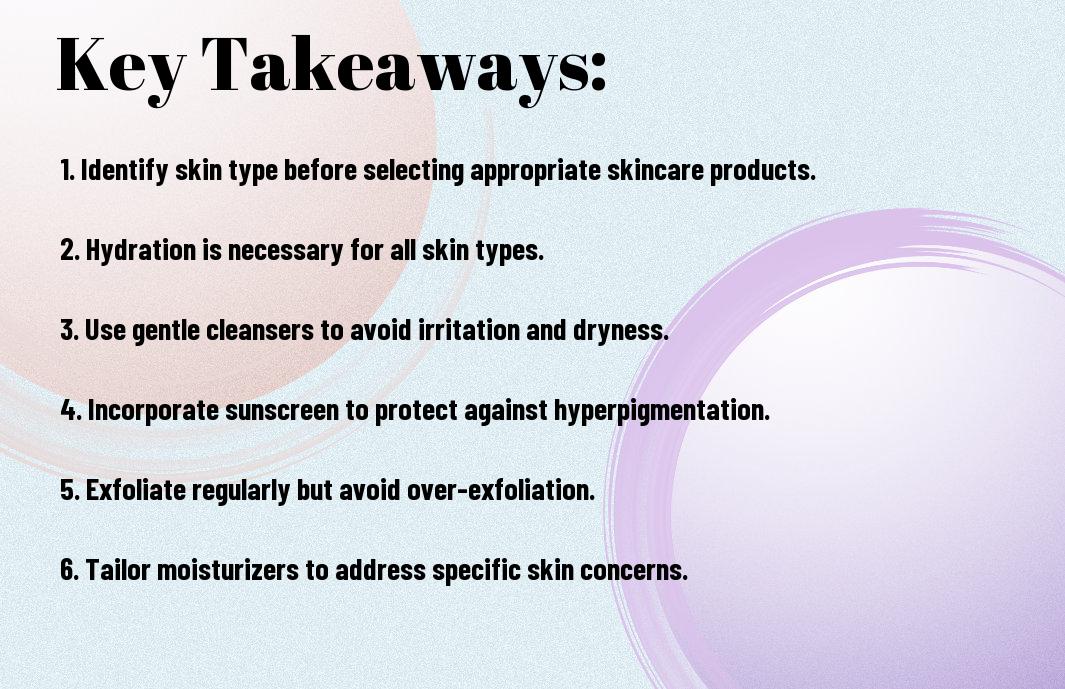
Decoding the Myriad of Skin Types
Understanding your skin type is central to customizing an effective skincare routine. There are several skin types shaped by factors like genetics, climate, and personal habits. Here’s a breakdown of the primary skin types that Black women often experience:
| Skin Type | Characteristics |
| Oily | Excessive sebum production, visible pores, and a shiny appearance. |
| Dry | Flaky, rough texture, and can feel tight or itchy. |
| Combination | Mix of oily and dry areas, often oily in the T-zone and dry on the cheeks. |
| Sensitive | Prone to redness, irritation, and reactions to products. |
| Normal | Well-balanced moisture levels, fine texture, and less prone to breakouts. |
After identifying your skin type, you can tailor your skincare regimen to ensure you’re using the right products for your specific needs.
Oily Skin: Traits and Challenges
Oily skin is often marked by a shine that can feel greasy. Those with this skin type may battle enlarged pores and frequent breakouts due to excess sebum production. Achieving balance requires careful product choices that control oil without over-drying the skin.
Dry Skin: Nature and Nurture
Dry skin presents a unique challenge as it can feel tight and flaky, often leading to a dull appearance. Factors such as humidity and personal habits can exacerbate this condition.
Given that dry skin lacks adequate moisture, you might find yourself needing to focus on products that provide hydration and lock it in. Opt for rich creams and consider adding a humidifier to your environment to combat dryness. Exfoliation should be approached gently but regularly to remove dead skin cells that contribute to a rough texture.
Combination Skin: The Balancing Act
With combination skin, you’ll find yourself navigating both oily and dry areas, usually with a shiny T-zone and drier cheeks. This dual nature creates a balancing act in your skincare routine.
For combination skin, it’s beneficial to use a multi-faceted approach. Use lightweight products on the oily areas while providing richer formulations for dry sections. Implementing a gentle exfoliation routine can also help in harmonizing the differences in your skin.
Sensitive Skin: Awareness and Care
Sensitive skin requires special attention due to its tendency to react adversely to various products. You might experience redness, itchiness, or burning sensations with even the mildest formulas.
With sensitive skin, I advise sticking to hypoallergenic and fragrance-free products to minimize irritation. It’s best to perform patch tests when trying new skincare items and to maintain a straightforward routine with fewer products for optimal comfort.
After familiarizing yourself with your skin type, I hope you feel empowered to select products and routines that will enhance your skin’s natural beauty and overall health.
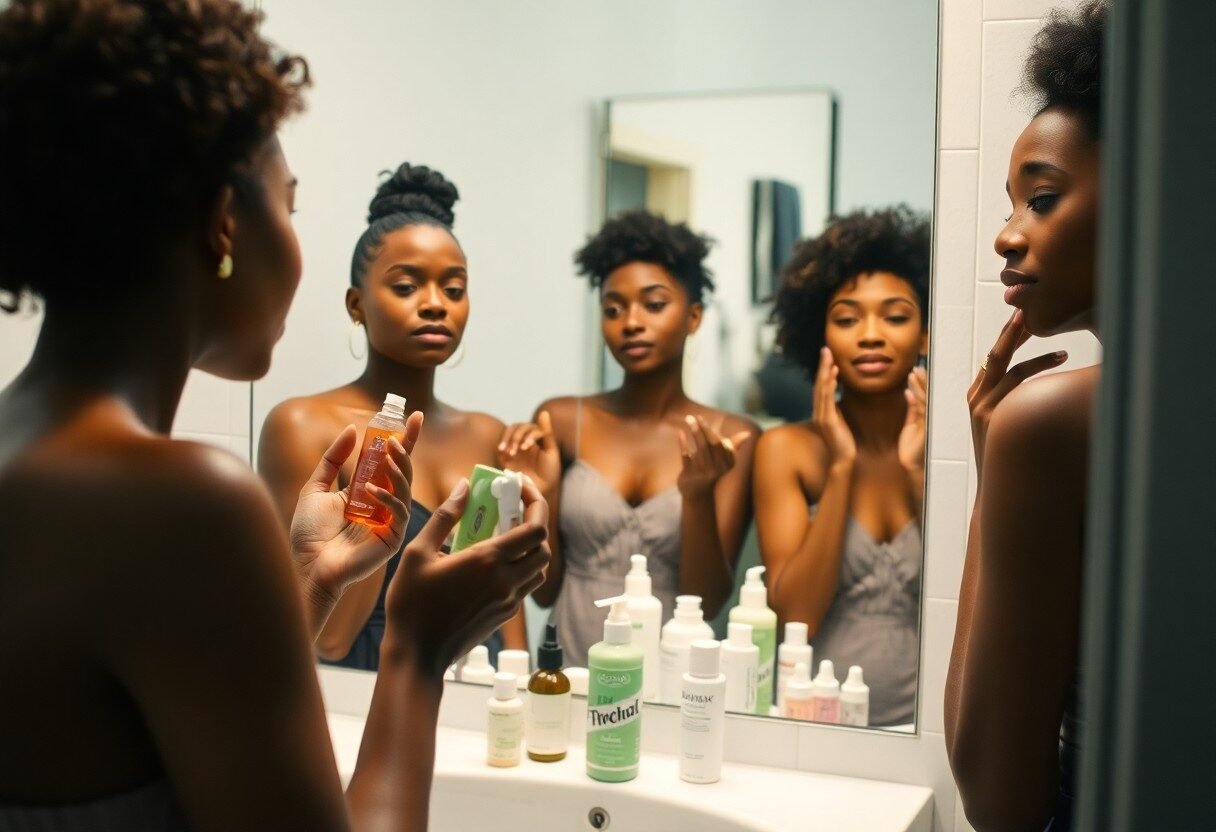
Tailoring Skincare Routines: A Step-by-Step Guide
| Skin Type | Recommended Steps |
|---|---|
| Oily | Use a foam or gel cleanser, exfoliate 2x weekly, lightweight moisturizer, and oil-free SPF. |
| Dry | Cream-based cleanser, exfoliate 1x weekly, rich moisturizer, and hydrating SPF. |
| Combination | Gentle cleanser, exfoliate 1-2x weekly, balance moisturizer, and broad-spectrum SPF. |
| Sensitive | Fragrance-free cleanser, gentle exfoliation 1x weekly, soothing moisturizer, and hypoallergenic SPF. |
Cleansing Techniques for Every Skin Type
Identifying the right cleansing technique is crucial for maintaining healthy skin. For oily skin, I often recommend using a foam or gel cleanser that helps remove excess oil without over-drying. Individuals with dry skin benefit from cream-based cleansers that hydrate while cleansing. Combination skin can thrive with mild cleansers that target both dry and oily areas, while sensitive skin requires gentle, fragrance-free options to prevent irritation.
Exfoliation: Finding the Right Approach
Exfoliation is a necessary step in any skincare routine but requires a personalized approach. Choose chemical exfoliants like AHAs or BHAs for oily skin, as they effectively unclog pores. I opt for gentle scrubs or enzymatic exfoliants for dry skin, ensuring I don’t strip away moisture. Combination skin can use exfoliants on oily zones while being more gentle on the dry areas, and sensitive skin should stick to mild formulas that avoid physical scrubs altogether.
As I explore exfoliation further, various products, such as lactic acid or glycolic acid, work wonders for oily types by dissolving dead skin cells. For dry skin, formulations containing sugar or oatmeal provide gentle yet effective exfoliation without leading to redness or irritation. Typically, incorporating exfoliation once or twice a week is ideal for maintaining a balanced, clear complexion tailored to your specific skin needs.
Moisturizers: Customized Hydration Solutions
A well-tailored moisturizer is vital for keeping your skin hydrated and healthy. For oily skin, I prefer lightweight, oil-free moisturizers that provide hydration without clogging pores. Dry skin requires thicker, richer creams loaded with emollients and occlusives for maximum hydration. Combination skin benefits from a balanced moisturizer, while sensitive individuals should seek out calming formulas with soothing ingredients like aloe and chamomile.
Diving deeper into moisturizers, I find that products with hyaluronic acid are fantastic for all skin types as they attract and retain moisture. Gel-based moisturizers are particularly effective for oily skin, while creamy, barrier-repairing products are crucial for those with dry skin. Combination skin can utilize hydrating serums beneath a balancing moisturizer, and sensitive skin should look for paraben-free and fragrance-free options to reduce irritation.
Sun Protection: A Universal Must
No skincare routine is complete without sun protection. A broad-spectrum SPF is crucial for all skin types, regardless of complexion. For oily skin, I often recommend lightweight, matte-finish sunscreens to avoid a greasy appearance. Individuals with dry skin can opt for hydrating formulas that also help moisturize. Combination skin should benefit from a balanced formula, while sensitive skin needs mineral-based sunscreens with calming ingredients.
Sun protection is particularly relevant for Black women, as darker skin tones can still suffer from UV damage, leading to hyperpigmentation and other long-term issues. Incorporating a minimum SPF of 30 daily is non-negotiable. I also suggest reapplying every two hours, especially during outdoor activities, to maintain optimal skin health, regardless of skin type. This ensures you are well-covered against both UVA and UVB rays, allowing your skin to thrive.
The Role of Ingredients in Black Skin Care
Antioxidants: Defending Against Oxidative Stress
Incorporating antioxidants into your skincare routine is important for combating oxidative stress, which can lead to premature aging and skin issues. Ingredients like vitamin C, green tea extract, and ferulic acid not only neutralize damaging free radicals but also help brighten your complexion and promote even skin tone.
Oils and Butters: Nourishing Natural Emollients
Pure oils and butters serve as powerful emollients that hydrate and protect your skin’s moisture barrier. For Black women, ingredients like shea butter, coconut oil, and jojoba oil can provide deep hydration while soothing inflammation and enhancing elasticity.
Using oils and butters can dramatically improve skin texture, especially for those with dry or combination skin types. These rich emollients contain fatty acids that maintain moisture levels and keep skin supple. Additionally, they often possess anti-inflammatory properties that can calm irritated areas, making them excellent choices for those prone to eczema or hyperpigmentation. Experimenting with different combinations can also help you customize your hydration strategy based on your unique skin needs.
Active Ingredients: Targeting Common Concerns
Active ingredients like retinol, niacinamide, and hyaluronic acid effectively target common issues such as fine lines, uneven texture, and dullness in Black skin. By selecting products infused with these actives, you can maximize the benefits and see noticeable improvements over time.
Focusing on active ingredients allows you to hone in on specific concerns you might face. For instance, retinol is renowned for its ability to boost collagen production and reduce signs of aging, while niacinamide works wonders for minimizing pores and evening out skin tone. Other noteworthy actives, such as alpha hydroxy acids (AHAs) and beta hydroxy acids (BHAs), can promote gentle exfoliation, helping to lift away dead skin cells and reveal a brighter, more radiant complexion. Personalizing your routine with these targeted solutions can make a significant difference in achieving your skincare goals.
Myths and Misconceptions in Black Skincare
The Darker Skin Myth: Understanding Hyperpigmentation
Hyperpigmentation is often misunderstood within the context of darker skin. Many believe that it only occurs due to sun damage or genetics. In reality, a variety of factors, such as inflammation, hormonal changes, and even certain medications, can trigger this condition. Additionally, while darker skin does have more melanin, it doesn’t make it impervious to the effects of sun exposure, highlighting the necessity of using sunscreen to protect against UV rays.
Misunderstanding Moisturizers: Addressing Stereotypes
There is a common stereotype that Black skin doesn’t need moisturizing as much as other skin types. This is not true. In fact, Black skin can often be prone to dryness. Many individuals overlook the importance of using a quality moisturizer that fits their specific skin needs, which can lead to various skin issues. Addressing these stereotypes enables a more informed perspective on skincare.
| Common Myths | Reality |
| Dark skin doesn’t experience sunburns | All skin types are susceptible to UV damage. |
| No need for moisturizers | Moisturizers are vital for maintaining skin health. |
| Hyperpigmentation is only due to sun exposure | Many factors contribute to hyperpigmentation. |
| All ethnicities have the same skincare needs | Skin types vary significantly among individuals. |
| Skincare products are universal | Products should be tailored to specific skin types. |
It’s easy to see how stereotypes can misguide your approach to skincare. People often believe that because Black skin is thicker and produces more oil, it inherently requires fewer moisturizers. In fact, this misconception can lead to barrier disruption and increase the risk of conditions like eczema and dermatitis. Selecting a moisturizer that works with your skin type is vital in achieving that soft, healthy glow.
- Moisturizer is vital for skin health.
- Understanding hyperpigmentation enables better management.
- All skin types need sunscreen, regardless of melanin.
- Awareness of skincare routines boosts confidence.
- Have realistic expectations about skincare results.
| Benefits of Moisturizing | Potential Risks of Skipping |
| Maintains skin barrier | Increased dryness |
| Reduces flakiness | Cracking skin |
| Helps with absorption of other products | Product wastage |
| Maintains elasticity | Premature aging |
| Provides hydration | Heightened susceptibility to irritants |
Cultural Influences on Skincare Practices
Traditional Remedies: Wisdom from Ancestors
Generations of Black women have passed down traditional remedies that harness the power of natural ingredients. From shea butter used for its moisturizing properties to peppermint oil for soothing inflammation, these homegrown solutions highlight longstanding cultural practices. Using coconut oil for hair and skin, or tea tree oil for blemishes, connects us to our ancestry, embracing the rich heritage of wisdom our forebears imparted.
Modern Influences: Impact of Social Media and Celebrity Culture
Social media platforms have transformed how beauty regimens are shared and consumed. Celebrities like Rihanna and Naomi Campbell often dictate trends, shaping public perception around beauty standards and skincare routines. With millions of followers, their endorsements can instantly popularize specific products, sometimes overshadowing traditional methods.
The surge in popularity of skincare tutorials and product recommendations through influencers has created a marketplace buzzing with options. I find myself frequently swayed by a viral skincare hack or glowing reviews on Instagram. For instance, the #SkincareRoutine hashtag has over 600 million views, demonstrating how deeply these platforms have embedded skincare knowledge and trends in our culture. This duality of modern and traditional influences can be empowering, but it also requires discernment when it comes to crafting a skincare routine that truly meets your needs.
Navigating Seasonal Changes and Skin Care
Adapting to Humidity: Summer Strategies
Summer often brings increased humidity, which can lead to oily skin and breakouts. I focus on lightweight, oil-free moisturizers to keep my skin hydrated without adding excess oil. Switching to a gel-based cleanser helps remove sweat and dirt more effectively. Incorporating products enriched with salicylic acid or witch hazel can help manage oil production, while regular exfoliation keeps pores clear and helps to prevent clogged pores.
Winter Skin: Combatting Dryness
Winter can take a toll on Black skin, leaving it feeling parched and flaky due to the dry air. To combat this, I rely on a richer, more emollient moisturizer to lock in moisture. Using a creamy cleanser prevents the stripping of natural oils, and I incorporate serums laden with hyaluronic acid to replenish hydration. Oils, such as jojoba or argan oil, can also be layered on top of your moisturizer for added protection from harsh winter elements.
In the winter months, the drop in humidity levels means my skin can lose moisture faster than during warmer seasons. I suggest a humidifier in your home to maintain skin hydration and using products with occlusives like petrolatum to seal in moisture. Regular exfoliation, perhaps once a week, helps remove dead skin cells, allowing better absorption of hydrating products. An emphasis on nourishing your skin with ingredients like ceramides can improve your skin barrier, making it resilient against the frigid weather, which allows your skin to look and feel its best year-round.
Building a Holistic Approach to Skin Health
The Connection Between Diet and Skin
What you eat significantly impacts your skin health, especially for Black women who may experience unique skin concerns. Incorporating omega-3 fatty acids, found in fatty fish and flaxseeds, can improve skin hydration, while antioxidants in fruits and vegetables help combat inflammation. Consuming a balanced diet rich in vitamins A, C, E, and zinc also promotes skin regeneration and repair. For instance, sweet potatoes and spinach not only nourish your body but also support your skin’s resilience against environmental aggressors.
Mental Well-Being: Stress Management Techniques
Stress can lead to increased oil production and exacerbate conditions like acne and eczema. Integrating stress management techniques such as mindfulness meditation, yoga, or simple breathing exercises can significantly enhance your skin’s appearance and overall health. Even just a few minutes of deep breathing daily can lower cortisol levels, reducing stress-related breakouts.
Taking time for self-care plays a fundamental role in how your skin looks and feels. Engaging in activities that relax you, such as journaling, painting, or taking nature walks, not only reduces stress but also boosts your mood. Practicing mindfulness helps you cultivate a more positive relationship with your skin by shifting your focus away from imperfections and towards appreciation of your unique characteristics. Finding what works best for you in terms of relaxation can create a beautiful harmony that reflects in your skin’s glow.
Community Voices: Insights from Black Women
Personal Stories: Triumphs and Trials
Listening to the experiences of Black women reveals a tapestry of trials and triumphs in skincare. For many, navigating the diverse range of products available can be overwhelming; however, I found that sharing our stories has empowered us all. One woman recounted how discovering a natural oil blend elevated her skin’s glow, while another shared her struggles with hyperpigmentation and how education helped her regain confidence. The resilience and creativity in our approaches showcase the strength within our community.
Expert Opinions: Dermatologists on Emerging Needs
Dermatologists are beginning to recognize the unique skincare needs of Black women, driven by an increasing emphasis on customized solutions. They highlight that conditions like hyperpigmentation can be exacerbated by certain treatments that don’t cater specifically to our skin. With an evolving landscape of research focused on melanin-rich skin, experts now advocate for inclusive product development that addresses these nuances, paving the way for brands to be more conscious of the diverse audience they serve.
Some dermatologists have pointed out that the systemic lack of diversity in clinical trials is a significant hurdle. For instance, studies show that only 25% of skincare products are tested on individuals with darker skin tones, which skews results and recommendations. The need for tailored formulations is clear; products should cater not just to varying skin types but also to the melanin-rich complexion to address issues like dark spots and keloid formation more effectively. It’s encouraging to see brands and professionals actively pushing for change, but continued awareness and advocacy are imperative to ensure we see tangible results in the skincare industry.
Final Words
With these considerations in mind, tailoring your skincare routine to your unique skin type is imperative for achieving healthy, radiant skin. I encourage you to assess your skin’s needs, whether it’s dryness, oiliness, or sensitivity, so that you can choose the right products and techniques. Ensuring that your routine addresses specific concerns while celebrating your natural beauty will enhance your overall confidence. By investing in your skincare, you’re not only caring for your skin but also embracing your identity as a Black woman.
FAQ
Q: What are the basic steps in a skincare routine for black women with oily skin?
A: A basic skincare routine for black women with oily skin typically includes the following steps:
1. Cleanser: Use a gentle foaming or gel cleanser that targets excess oil and impurities without stripping the skin.
2. Toner: Apply an alcohol-free toner to help balance the skin’s pH and remove any leftover residue.
3. Exfoliant: Incorporate a chemical exfoliant, such as salicylic acid, a few times a week to prevent clogged pores.
4. Moisturizer: Opt for a lightweight, oil-free moisturizer to hydrate without adding extra shine.
5. Sunscreen: Daily application of broad-spectrum sunscreen (SPF 30 or higher) is imperative for protecting your skin.
Q: What should be included in a skincare routine for dry skin in black women?
A: For black women with dry skin, a skincare routine should focus on hydration and moisture retention:
1. Cleanser: Choose a creamy or oil-based cleanser that nourishes while cleansing.
2. Exfoliator: Use a gentle exfoliating product, like a sugar scrub or a chemical exfoliant, once or twice a week to promote cell turnover.
3. Toner: Implement a hydrating toner packed with humectants like hyaluronic acid or glycerin.
4. Moisturizer: Use a rich, emollient moisturizer or facial oil to lock in hydration.
5. Sunscreen: Apply a moisturizing broad-spectrum sunscreen to protect the skin.
Q: How can black women treat hyperpigmentation in their skincare routine?
A: Treating hyperpigmentation often involves these steps:
1. Cleanser: Start with a gentle cleanser to prepare the skin for treatment.
2. Exfoliant: Use a chemical exfoliant to slough off dead skin and help fade dark spots.
3. Treatment: Include serums with active ingredients such as vitamin C, niacinamide, or kojic acid to target discoloration.
4. Moisturizer: Hydrate with a moisturizer that supports barrier function.
5. Sunscreen: Daily SPF is vital to prevent further darkening of existing spots and protect the skin during the day.
Q: What are the best ingredients for sensitive skin in black women?
A: Black women with sensitive skin should look for the following ingredients:
1. Aloe Vera: Known for its soothing properties.
2. Chamomile Extract: Helps to calm irritation and redness.
3. Ceramides: Strengthen the skin barrier and retain moisture.
4. Hyaluronic Acid: Deeply hydrates without causing irritation.
5. Fragrance-Free Formulas: Avoid products with synthetic fragrances to minimize sensitivity.
Q: How can I incorporate sunscreen into my daily routine without it causing breakouts?
A: To use sunscreen without exacerbating breakouts, consider these tips:
1. Choose Non-Comedogenic Products: Look for sunscreen labeled as non-comedogenic, meaning it won’t clog pores.
2. Gel Formulas: Opt for gel or lightweight lotions designed for oily or acne-prone skin.
3. Apply After Moisturizer: Allow your moisturizer to absorb before applying sunscreen to reduce the risk of pilling.
4. Patch Test New Products: Before incorporating new products, do a patch test to see how your skin reacts.
Q: Can black women adopt a nighttime skincare routine that targets multiple concerns?
A: Yes, a nighttime skincare routine for black women can effectively target multiple skin concerns:
1. Cleanser: Begin with a gentle cleanser to remove makeup and impurities.
2. Treatment: Layer on targeted treatments for issues like hyperpigmentation, dryness, or acne.
3. Moisturizer: Follow up with a nourishing moisturizer or overnight mask to repair the skin while you sleep.
4. Optional: Incorporating a retinol product can also help in improving texture and tone but should be introduced gradually.
Q: How can seasonal changes affect my skincare routine as a black woman?
A: Seasonal changes can alter the skin’s needs. In winter, skin may become dry and require richer moisturizers. In summer, oil production may increase, demanding lighter, oil-free formulations. It’s beneficial to adjust the cleanser, moisturizer, and sunscreen depending on the season to properly support the skin’s different requirements throughout the year.


